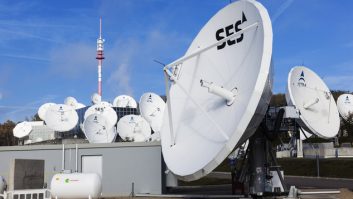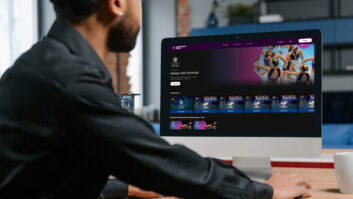The MHP licence fees row rumbles on: the delegates at DVB World in Dublin early this month witnessed an astonishing own goal as the patent pool behind MHP [see TVB-E newsletter 9 March] tried to kill off their golden goose with a regime of hefty licence fees, writes George Jarrett.
These were immediately denounced as “farcical” by a group of over 20 European broadcasters, and they will be represented in attempts to re-negotiate the terms by the EBU’s Phil Laven.
Via Licensing, working for the patent pool, sent European representative Helene Jay to DVB World to present its terms for free-to-air interactive TV services using the DVB-MHP standard. This coincided with the terms appearing in a same day press statement, so delegates had no inkling of what was to come.
Admitting later that she knew she was lighting blue touch paper, Jay explained that the licence fee for consumer devices would be $2 per device. Where MHP services come from a subscription-based provider, they will pay $0.25 per subscriber per year or $1.25 for a five-year license.
Free to air broadcasters offering MHP-based services for free will pay according to audience size: up to 2.5 million they will owe $25,000, and there are other sums to the maximum of $100,000. Those with an audience of 0.1 million don’t pay anything. There is a second set of fees for free-to-air broadcasters offering charged services like PPV, and they will run from $50,000 to $200,000.
There was good news to go with the bad on the Via web site: — ‘As the purpose of the pool is to promote wide adoption of MHP by the market, license fees for MHP services broadcast free-to-air will not be charged by the MHP patent pool before January 1 2009’ – but the promise of this ‘incentive period’ did not soften the anger.
One of the first to react was Oddvar Kirkbakk of NRK, who said, “This is very serious for the future of MHP. In Norway we made the decision to deploy MHP in all our set-top boxes, but now we have to analyse that situation and MHP will be in danger. We would have to look for alternative APIs.”
Fresh from interjecting from the floor, Phil Laven said, “I am not just disappointed by the behaviour of the patent pool, I am outraged. Five years ago the DVB steering board spent a long time talking about the licensing of MHP, and about the Java elements, and there was huge concern that we were going to give it to a monopoly provider.
“They spent a lot of effort on making sure that the terms and conditions for Java were fair and reasonable and eventually it came down to an agreement that the Java license would be no more than $1 per set-top box. In many cases, that would be zero cost because of Sun’s cross licensing arrangements. After a huge amount of argument about the detail of the wording concerning the sub set, super set and so forth everybody declared themselves satisfied and said, ‘OK. We will not be stung by license fees for MHP.’
Five years on and out of the blue, that comfort zone has been ruined by what we know to be a ‘submarine’ patent.
“If it had been a submarine patent from a lone inventor in the middle of Nebraska you would say, ‘OK. It’s one of those things.’ In this case, I believe that most of the members of the patent pool had representatives present on the DVB steering board during those original discussions,” said Laven. “For that patent pool to come along now and say, ‘Oh, it’s only going to be $100,000 per year per broadcaster and don’t worry that’s very fair and reasonable,’ isn’t right,” he added. “The most unreasonable thing is the delay. Italy got 4.1 million set-top boxes on air at the end of January only to be told now, ‘By the way, you’ve now got to manage a license fee’.”
Laven accepts that the new fees don’t kick in for three years, but said: “You can’t unwind the clock and take those set-top boxes back. I’ve talked to broadcasters from many countries that have asked what they can do. Typically they say, ‘We were going to launch MHP, but having seen that we’re not going to.’ That is going to test the marketplace.”
Helene Jay named Comcast, Open TB, Panasonic, Royal Philips Electronics, Samsung, Thomson and Time Warner Cable as amongst the patent pool and said other patent holders did not want to be revealed. She emphasised that, “No fee will be applied before January 1 2009 for free-to-air applications,” but within a few minutes one German and one Spanish broadcaster had decided to abort MHP projects. Speaking for RTI-MEDIASET, head of technologies Manlio Cruciatti told TVB-E, “We haven’t yet defined our precise strategy after the disclosure of the fees by Via Licensing, due to lack of clarity on the rules.
“We are really worried for the real risk to kill MHP in countries like Italy, where the service is on-air. Small operators that cover ‘potential’ audiences of millions of households cannot afford the expensive fees, and will stop the service,” he added. “Others will never start, but the organisation that has the role of developing the Italian market for digital terrestrial, DGTvI, is committed to responding to Via Licensing.”







